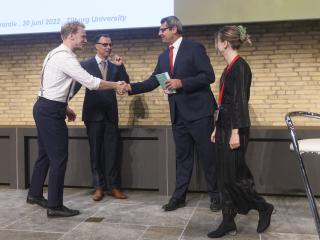Research Tilburg Law School
Just as society changes when the law changes, so too the law is continually changing along with society. Globalization, technological developments, pluralism and the need to live more sustainably pose major challenges in the 21st century. At the same time, we are confronted with poverty, inequality, insecurity, crime and injustice. The research at Tilburg Law School focuses on understanding these developments and its impact on interpersonal and institutional relationships and the law.
We aim to excel and make an impact by combining forces across research disciplines, focusing on four research programs.
Research programs
-

Global Law and Governance
In our transforming societies, law and governance have come under pressure. This research program takes on the rethinking of law and governance and also offers ways forward. We start from the major societal challenges like climate change, further globalization and increasing inequalities, the growing importance of social media, and migration.
More information -

Regulating Socio-Technical Change
Technology is playing an ever more invasive role in all walks of life. But regulation often lags behind the speed of technology development. We study how we can integrate new technology in society through regulation in such a way that everybody benefits.
More information -

Connecting Organizations in a Sustainable Society
The traditional regulatory mechanism of setting minimum standards is no longer always effective as information technologies offer new ways of organizing and regulating economic activities. How can the law enable, support and challenge these new approaches towards a sustainable society?
More information -

Crime and Criminal Justice in the Age of Globalization and Digitalization
Today’s ever-changing and globalizing societies are faced with new forms of crime that undermine democratic values, the rule of law and the functioning of societal institutions and bodies. Modern technology generates new forms of criminality. In this era of globalization and digitalization, new approaches to combat crime are needed and explored. The changes to crime, how these materialize and the responses to them are studied in this research program.
More information
Special research projects
Tilburg Law School conducts three research projects funded by the Dutch Ministry of Education, Culture and Science, to boost Dutch study programs in law as well as societal debate on pressing issues regarding law and governance. The research projects are integrated in the signature plans.
Digital Legal Studies: From regulating human behavior to regulating data
Classically, regulation targets human behavior. In an era of Big Data, artificial intelligence, and robotics which shape and sometimes even replace human behavior, however, the classic regulatory paradigm is challenged in fundamental ways. This research program aims to map, understand, and – to the extent possible – help shape the shift from a human-centric regulatory paradigm to a data-centric regulatory paradigm.
This project recognizes the importance of human behavior and human decision-making, but challenges the assumption that regulation should continue to primarily be focused on facilitating adequate human decision-making. Rather, the shift towards automated decision-making—with its conflation of norm-setting and norm-enforcement—may require a more fundamental rethinking of the regulatory paradigm.
To this purpose three research lines are pursued focusing on key elements of regulation shifting from a human behaviour and human relations to data relations and the behaviour of data systems:
- how rules can be formulated and enforced,
- which concepts can be used in regulation, and
- and which values are vital.
Website
Publications
Transformative effects of Global Law: Constitutionalizing in the Anthropocene
Catastrophic environmental degradation is the most urgent global challenge for humanity today, and facing it demands major societal transformations at all levels.
Ours is the era of the Anthropocene, a geological period in which man is the dominant influence on the world around us to such a degree that our legal frameworks have become inadequate to manage the risks. Distressingly little thought has been given to the legal implications of the transformations that the Anthropocene is demanding of us.
Our key hypothesis is that it is inadequate to simply and uncritically ‘globalize’ our current understandings of law and governance to face this challenge. First, it is necessary to reconsider the concept and dimensions of a decision-making collective that includes nature and future generations. Second, we will need to reconfigure our notions of territorial jurisdiction in ways that overcome the simple division between the global and the local by instead positing distinctions in terms of the sustainability of earth systems.
This project aims at generating new concepts alongside new regulatory and institutional models. These ideas are being harnessed and developed within networks of key academic, professional, and policy actors. The project will also devise ways to educate the next generation of lawyers and legal scholars.
Publications
Transformative effects of Global Law: Judicial Lawmaking
Citizens and NGOs are increasingly addressing courts to force governments to change policy. This can be seen as an expression of the will to participate in public-decision making other than through voting and relying on the representative democracy. The reason this is happening has to do with a decline of the primacy of parliament in the legislative process both at the national and the European level.
Due to the pace of technological development, the legislature also relies increasingly on skeleton legislation and far-reaching delegation of regulatory tasks to non-elected executive agencies and private regulators. This forces courts to step in and act as regulatory watchdogs and more than occasional rulemakers where legislators fail to act, as is for example the case with regard to climate change law.
This research project concentrates on the increasing role of judicial lawmaking in a changing world. The traditional argument against judicial lawmaking and courts acting as more than ‘occasional legislators’ is that courts have no democratic legitimacy. This project, however, starts from the presumption that societal changes could change the role of courts legitimately.
What could it mean for courts to act as quasi legislators? What methods of lawmaking in a multilevel legal order can they apply and how do they seek legitimacy for their decisions? Besides answering these questions special attention is paid to the role of empirical data and scientific evidence to support judicial law making, and to how courts try to take into account the possible consequences of different possible decisions for society via, for instance, amicus curiae letters and court hearings.
Program leaders
Explore more about:
- Research on law
- Research on governance
- Our researchers
News and events
-
Digital government is blind to millions of 'non-average' citizens
22nd April 2024Administrative law is designed for the 'normal citizen' with an average income, education, intellectual and digital skills, a stable family, and good health. Individuals who deviate from this ideal are often overlooked in the regulatory process or treated with reluctance. With the digitalization and automation of government, this situation has worsened.

-
Regulation of technology calls for a different view of humans
16th April 2024When it comes to regulating digital technology, such as generative AI and algorithms, the focus is often on the technology itself rather than the human who interacts with it in practice. We must acknowledge that humans are never entirely predictable; otherwise, regulation will never be effective.

-
Researcher Mara Păun wins Johannes Cornelis Ruigrok Prize
08th April 2024The Royal Holland Society of Sciences and Humanities (KHMW) has awarded the J.C. Ruigrok Prize to researcher Mara Păun (TLS). She will receive the prize on June 14 for her PhD thesis on the interaction between legal and technological developments.









